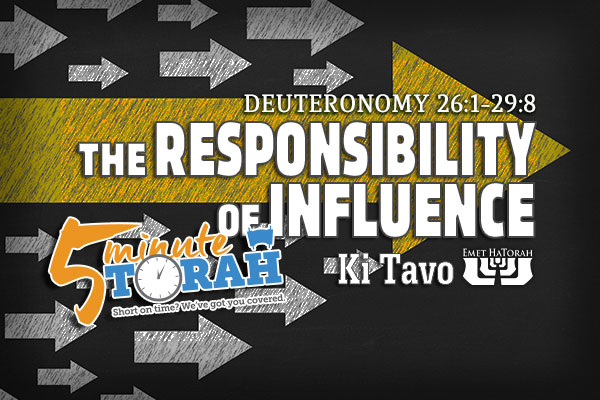Parashat Ki Tavo - Deuteronomy 26:1-29:8
Series:

The Responsibility of Influence
Parashat Ki Tavo is so named because of its open verse, which says, “When you come into the land that the LORD your God is giving you for an inheritance and have taken possession of it and live in it …” (Deuteronomy 26:1). The words ki tavo mean “when you come.” Thus, this parashah is focused on the responsibility of the Children of Israel when they arrive in the land promised to them by Hashem. The first few paragraphs address bringing the bikkurim, the first fruits of the land to the LORD and the ceremony surrounding this procedure. After this Hashem gives Israel a reminder of their responsibility as a people who are consecrated to the LORD:
This day the LORD your God commands you to do these statutes and rules. You shall therefore be careful to do them with all your heart and with all your soul. You have declared today that the LORD is your God, and that you will walk in his ways, and keep his statutes and his commandments and his rules, and will obey his voice. (Deuteronomy 27:16–17)
Immediately following this, instructions are given to renew the covenant through a ritual which includes dividing up the tribes and set them onto two mountains: the Mount of Blessing (Mount Gerizim) and the Mount of Curses (Mount Ebal). The Levites are to command them from the valley between the two. The ones on Mount Gerizim are to bless the nation and the ones on Mount Ebal are to repeat a series of curses, to which all of the people will affirm, “Amen.” The specific curses that are to be recited are listed in verses 15-26. Two of these, however, are connected in a way that may not be obvious at first. Let’s look at these two curses and find the link between them:
“Cursed be anyone who misleads a blind man on the road.” And all the people shall say, “Amen.” (Deuteronomy 27:18)
“Cursed be anyone who does not confirm the words of this law by doing them.” And all the people shall say, “Amen.” (Deuteronomy 27:26)
The first verse we can understand in a much broader sense by extending this prohibition to include misleading the spiritually blind. Indeed, our sages teach us that this is the extended meaning of this passage and that we should be ever on our guard against misleading someone who does not have the spiritual capacity to discern our actions. This passage is about leading someone astray. We should not lead a spiritually blind person down the wrong path. The second verse, however, seems to merely be a rebuke against anyone failing to uphold the commandments of the Torah. How are these two related?
Moses ben Nachman, otherwise known as Nachmanides or Ramban, understands the phrase “anyone who does not confirm the words of this law” to apply to anyone who has the ability to influence others to follow the path of Torah, but chooses not to. He says that it applies especially to those who are well-studied (but only concerned about their own spirituality) and to those in leadership roles. Rather than simply being a rebuke against failing to observe the Torah’s instructions, Ramban understands this to be a rebuke against passiveness in our responsibility to influence others for the good.
Let’s face it. Leadership is influence. Leaders are held to a higher responsibility because of this. The behavior of a leader influences the behavior of their followers, either positively or negatively. If a person is truly a leader, it doesn’t take much effort for to influence people to take action. They can either lead people to Torah and mitzvot or lead them to a path of destruction.
But this is not limited to those who are in the limelight. We are all leading people one direction or another, because we all have some sort of influence. Some of us have a greater influence over people than others. Some of us have an influence over larger numbers of people. But neither the magnitude nor the volume of people we are influencing negates this principle. We have a responsibility to lead the blind on the proper path and uphold the words of the Torah in the eyes of all who see us. We must take this responsibility seriously. If we are cognizant of the fact that we are influencing others—either for the good or for the bad—then we should be using that influence to lead people on a path that will bring them into a closer relationship with their Creator. How will you use your influence today?








